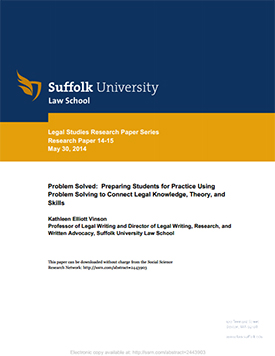Preparing Law Students for Practice Using Problem-Solving
 Many advocates for legal education reform state that the traditional Socratic lecture model in law schools must be supplemented by experiential learning. Kathleen Elliott Vinson, Professor of Legal Writing and Director of Legal Writing, Research, and Written Advocacy at Suffolk University Law School, an Educating Tomorrow's Lawyers Consortium school, recently published a paper advocating for experiential learning through a curriculum that emphasizes problem-solving.
Many advocates for legal education reform state that the traditional Socratic lecture model in law schools must be supplemented by experiential learning. Kathleen Elliott Vinson, Professor of Legal Writing and Director of Legal Writing, Research, and Written Advocacy at Suffolk University Law School, an Educating Tomorrow's Lawyers Consortium school, recently published a paper advocating for experiential learning through a curriculum that emphasizes problem-solving.
The paper, “Problem Solved: Preparing Students for Practice Using Problem Solving to Connect Legal Knowledge, Theory, and Skills,” is intended to help law schools and professors make their students more practice- and client-ready. It also explains how problem-solving bridges the gap between theory and practice, while illustrating ways problem-solving can deepen students' understanding of the law.
Professor Vinson explores why there is a need for problem-solving instruction in law schools, defines a problem-solving methodology that is client-centered, offers different examples of ways to incorporate its instruction within law school curricula, and discusses its benefits and challenges in legal education.
Riley Combelic is a third-year law student at the University of Denver Sturm College of Law and contributes to IAALS Online. Please direct inquiries about this post to iaals@du.edu.


